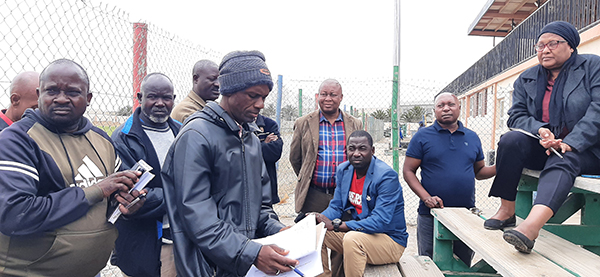Lawmaker Elma Dienda wants parliament to change the rule that forces civil servants, members of the National Council and regional and local councillors to resign while standing for National Assembly elections.
The Popular Democratic Movement’s MP contended the only reasonable conditions that can apply is if members of the public and civil service are compelled to resign from their jobs after being duly elected as members of the National Assembly.
“Despite the fact that equal treatment is one of the fundamental principles of our democracy, it seems that our own constitution directly discriminates against certain members of society, and their inalienable right to participate in our elections and democratic processes,” she said on Wednesday while tabling a motion to amend parts of Article 47 (1) (e) (f) and (2) (b) of the Namibian Constitution.
She argued it violates the rights of members of the national council, regional and local authorities as well as civil servants from participating freely in the National Assembly elections.
In October 2019, the electoral commission of Namibia (ECN) issued a directive that all politicians employed in the public service and those serving in local and regional authorities should resign from their jobs upon being nominated as National Assembly candidates.
The directive saw many candidates, especially from Swapo, tendering their resignations hoping to go to the National Assembly.
However, some who resigned did not make it to the National Assembly and are unemployed.
Article 47 (1) (e) of the Constitution states no persons may become members of the National Assembly if they are remunerated members of the public service of Namibia; or (f) are members of the National Council, regional councils, or local authorities.
Similarly, Article 47 (1) (f) stipulates that no persons may become a member of the National Assembly if they are members of the National Council, regional councils, or local authorities.
The same article (2) (b) indicates that the public service shall be deemed to include the defence and police forces, the prison service, parastatal enterprises, regional councils, and local authorities.
“Article 47 should be amended. We must not make and normalise laws that are unreasonable. Every law has to make common sense, and 47 (1) (e) and (f) and sub-article 2 (b) clearly do not meet the standards of common sense. I would, therefore, recommend that this motion be sent to the relevant standing committee for further scrutiny and to report back to this August House,” Dienda moved.
During 2019, at least five by-elections were held within 90 days, following the resignations of Swapo-affiliated regional councillors who opted to contest parliamentary seats on the party ticket in the National Assembly election.
The Electoral Act automatically triggered the by-elections, which compels aspiring parliamentarians and those employed in the public service to first resign from their positions before running for office.
Some of the 16 Swapo MP candidates, who resigned in 2019, included regional councillors Margareth Mensah-Williams of Khomasdal, Hilma Nicanor of Keetmanshoop Urban, Hafeni Ndemula (Walvis Bay Urban), Modestus Amutse (Oshikuku) and Phillipus Katamelo of Gobabis constituency.
Apart from the five regional councillors, local authority leaders Katrina Shimbulu (Oshakati), Verna Sinimbo (Rundu), Maria Elago (Swakopmund) and Hilaria Mukapuli (Lüderitz) also resigned.
Other notable resignations included that of late former National Youth Council executive chairperson Mandela Kapere, former Oshakati CEO Werner Iita and education officials Veno Kauaria and Nono Katjingisiua.
Teacher Bertha Dinyando-Nyambe, former education inspector Kletus Karondo, and Swapo central committee member Jennelly Matundu also resigned.
Of the 17 Swapo MP hopefuls affected by the Electoral Act provision, only one opted out to continue as a local authority councillor.
At the time, Fransina Kahungu, who is a City of Windhoek councillor, withdrew her name from the Swapo list.
– anakale@nepc.com.na



